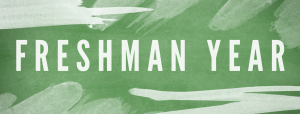
From walking across a graduation stage to stepping into the world of higher education, the life of a high school graduate can change drastically leading up to the highly-anticipated — and sometimes nerve-wracking — first day of college. To hopefully ease your mind a bit, here are a few tips and tricks to simplify your transition and help you expect the unexpected during your first year.
Prepare to be independent!
As you’ll come to discover, the choice to attend a two or four-year institution comes with great freedom, and as a result, great responsibility. From scheduling, enrolling, and attending classes to making time to work, eat, and sleep, the life of a college student can be a hectic one. Though, it doesn’t have to feel that way. Setting realistic goals, creating to-do lists, planning, and eliminating procrastination are just a few ways to reduce the stress that comes with pursuing any degree or certification.
To get the most out of college and your newfound independence, you’ll want to walk away with something learned. So, in addition to gaining the tools and knowledge needed to succeed in your chosen career path, actively strive to discover something new about yourself. You’ll be better for it.
Prepare to walk!
No matter the size of your college, you’ll want to anticipate traveling on foot. To prepare your body and mind for this change, consider taking a walking tour of your campus and class schedule before FDOC (the first day of class). Of course, cars and on-campus transportation are available options at some institutions, but be mindful of any parking fees or costs that come with these alternatives.
Your goal, hopefully, is to enjoy your time in college. With that in mind, familiarizing yourself with your new environment and the physical limits of your body can positively impact your on-campus experience. In other words, if you’re not traveling by car, bus, or metro, you may want to bust out those walking shoes.
Prepare for FUN!
Now for the best part. After a long week of classes and studying, you’ll want to find ways to relax your mind and enjoy the extracurricular offerings available on campus. If possible at your school, take advantage of student clubs, volunteer opportunities, art programs, athletics, Greek life, or other ways to get outside of your dorm. Not only can participating in university activities bring you lifelong social connections but professional relationships can also be developed by putting yourself out there. So, don’t be afraid to have a good time; it’ll definitely be earned!
Of course, everyone will experience college differently, and you’re bound to make mistakes. But, with proper preparation, dedication, and an open mind, you’ll grow to learn from your shortcomings and find that freshman year is not what you expected at all. It’s so much better.




